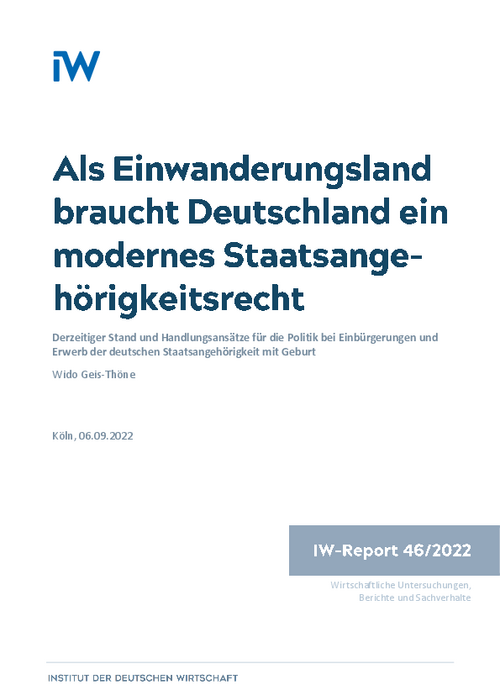It is not only in their own interest that immigrants living permanently in Germany and their descendants acquire German citizenship. It is also important for the development of society as a whole that no larger population groups who are largely excluded from political processes and public office do emerge.

As a country of immigration, Germany needs a modern citizenship law

It is not only in their own interest that immigrants living permanently in Germany and their descendants acquire German citizenship. It is also important for the development of society as a whole that no larger population groups who are largely excluded from political processes and public office do emerge.
However, only 132,000 people were naturalised in 2021. This is very few in relation to approximately 5.7 million foreigners who had reached the maximum required period of residence of eight years, which can be significantly undercut, especially in the case of co-naturalisation of family members and good integration. The loss of the previous nationality is only an obstacle for some of the immigrants, as there are so many exceptions to this requirement that in 2021 the previous nationality was retained in 69.0 per cent of the naturalisations. However, this is mostly not yet possible for the large group of Turks, who also only rarely naturalise. Policymakers should create equal conditions here and allow dual citizenship for all immigrants, as is already the case with the acquisition of German citizenship by birth. It would also make sense to ease the other minimum requirements for naturalisation, such as lowering the required length of residence. It is difficult to predict how many more immigrants could actually be won over to naturalisation in this way. In any case, in addition to further developing the legal framework, it is very important to specifically address and sensitise the persons in question.
Since the reform of the nationality law in 2000, children born to foreign parents in Germany are granted German nationality according to the country of birth principle under certain conditions, which include a minimum period of residence of the parents of eight years. Initially, this led to significantly fewer children growing up without German citizenship. However, this has changed again due to the strong immigration of recent years, and, at 5.8 per cent, the proportion of children under the age of 16 born in Germany with exclusively foreign nationality was back at the level of the early 2000s in 2021. The share of births without German citizenship even exceeded the previous peak of 13.3 per cent from 1996 with 13.7 per cent in 2020. Against this backdrop, adjustments are necessary here as well. In particular, it would make sense to reduce the minimum period of residence for the application of the country of birth principle. Nevertheless, there will continue to be a significant number of children who are born and grow up in Germany without German citizenship. These persons should later be given privileged access to citizenship against the background that they have gone through their complete educational path and socialisation in the country. It would even be conceivable to dispense with a formal naturalisation procedure and to grant German citizenship to them automatically when they reach the age of majority.

As a country of immigration, Germany needs a modern citizenship law

More on the topic

Record immigration not only due to flight from Ukraine
In 2022, more people immigrated to Germany than ever before in the history of the Federal Republic. Around 1.46 million more people moved here than left the country, which is more than a quarter more than the previous record of 1.14 million from 2015.
IW
Immigration from Latin America: Successes and potential for securing skilled workers
Against the background of the baby boomers leaving the labour market, Germany will be increasingly dependent on skilled workers from abroad in the coming years in order to secure growth and prosperity.
IW